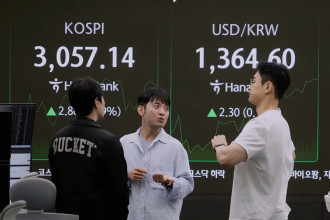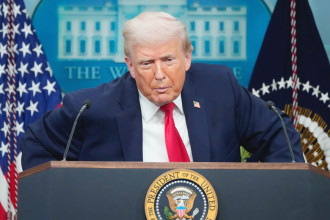-1753332281.jpeg)
In a rapidly shifting global landscape where alliances are being tested and new coalitions are taking shape, the role of BRICS – Brazil, Russia, India, China and South Africa – has become a focal point of international conversation. The webinar titled "Navigating BRICS: India’s Strategic Outlook & the Global South Agenda", held on July 18, brought together a distinguished group of scholars and policymakers to unpack BRICS’ evolving identity, India’s strategic positioning within it, and its broader implications for the global South.
Jointly organised by the Friedrich Naumann Foundation for Freedom South Asia, the Centre for Public Policy Research (CPPR), and the FNF Country Office North Germany, the webinar featured keynote remarks from former German Bundestag members Torsten Herbst and Dr. Marcus Faber. The panel was moderated by Soumya Chaturvedi, Visiting Fellow at India Foundation, and included Prof Dr Lucas Carlos Lima from Brazil, Dr D Dhanuraj from India, and Prof Dr Miriam Prys-Hansen from Germany.
Opening the session, Torsten Herbst, known for his liberal political roots, offered a German perspective on the relevance of BRICS. He acknowledged the alliance's potential for constructive cooperation, especially in giving voice to developing nations on the global stage. However, he was quick to note the contradictions within the group.
-1753332315.jpeg)
-1753332315.jpeg)
-1753332315.jpeg)
-1753332314.jpeg)
“It’s a very heterogeneous alliance,” he said, pointing to underlying tensions such as those between India and China, or Iran and the UAE. Unlike the deeply integrated European Union, Herbst described BRICS as a ‘loose alliance’ that remains useful but must be approached with caution.
He emphasised the importance of universal human rights and warned against overlooking differences among member states in the name of unity. On India's growing significance, Herbst was enthusiastic: “India for Germany is a very important country, not just because of its size, but because of its entrepreneurial spirit, its IT and manufacturing sectors, and its potential as a trade partner.”
He also highlighted Europe’s interest in diversifying its economic dependencies away from China, with India seen as a key strategic alternative. In his view, platforms like BRICS could help promote a fairer international economic order, if they remain committed to cooperation over confrontation.
Dr Marcus Faber, who served as Chairman of the Defence Committee in Germany, approached BRICS from a security standpoint. He expressed surprise at India’s strong involvement in a grouping that includes states like Russia and China, both of which present complex challenges to democratic norms and regional security.
“BRICS is not a values-based association,” he noted. “It includes dictatorships. That makes it difficult for European countries, who view alliances through the lens of shared democratic values, to fully trust its trajectory.”
Faber acknowledged India’s historic non-alignment stance but suggested that its deepening ties with BRICS send mixed signals. He hoped India would align more closely with democratic powers in future security and foreign policy considerations, especially as it navigates tensions with China in the Indo-Pacific.
Turning to the panel discussion, Prof Dr Lucas Carlos Lima assessed the recent BRICS summit in Rio de Janeiro. He praised Brazil’s presidency for prioritising practical cooperation over ideological grandstanding.
“This year, Brazil focused on health cooperation, climate change, and artificial intelligence – issues that resonate across the Global South,” he explained. Importantly, Lima noted a significant evolution in how BRICS operates: “We had over 200 inter-ministerial meetings. That kind of sustained engagement is creating real bureaucratic cooperation, which we didn't see a decade ago.”
He also highlighted the three main policy frameworks that emerged from the summit: a climate cooperation agreement, a platform on socially determined diseases, and a working group on artificial intelligence. “These are concrete steps toward turning BRICS into a more structured mechanism for collective problem-solving,” he said.
Responding to a question on India’s role in BRICS, Dr D Dhanuraj, Founder-Chairperson of CPPR, offered a nuanced view of India's positioning.
“India’s participation in BRICS is rooted in its founding role, but the global context has changed dramatically,” he said. As India grows in economic and geopolitical importance, it finds itself navigating a complicated web of interests.
“There’s pressure from both sides – balancing relations with China and Russia while maintaining strategic partnerships with the West,” Dr Dhanuraj noted. He pointed to India’s careful messaging on contentious issues such as the Ukraine war and its refusal to support a BRICS currency dominated by the Chinese yuan.
Quoting former Indian Prime Minister Atal Bihari Vajpayee, he remarked, “You can change friends but you can’t change your neighbours,” highlighting India’s pragmatic approach in dealing with China. Dhanuraj also noted the challenge of being seen as the leader of the Global South while remaining a strategic balancer in a transactional global order.
Finally, Prof Dr Miriam Prys-Hansen offered insight into how Europe and Germany in particular, views BRICS. She argued that Europe’s perceptions are divided – some vastly overestimate BRICS as a geopolitical threat, while others underestimate its practical value.
“One of BRICS’ biggest strengths is its ability to compartmentalise disagreements,” she said. “Where they can’t agree, they bracket the issue and move forward on other fronts.”
She noted that the shift from Russia’s confrontational presidency to Brazil’s more conciliatory approach has helped smooth some internal tensions and anticipated that India would follow a similar path.
Dr Prys-Hansen also warned against interpreting BRICS as purely anti-Western. “The language used by BRICS countries isn’t anti-Western, it’s non-Western. That’s an important distinction,” she explained. For Europe, she said, this non-Western identity presents both a challenge and an opportunity. “We need to understand BRICS on its own terms if we want to engage with it effectively.”
Throughout the webinar, one theme emerged clearly: BRICS is no longer a casual grouping of emerging economies. It’s becoming a platform for parallel diplomacy, cooperation on global issues, and strategic signalling.
While internal contradictions remain – between democratic and authoritarian governance, between economic rivals and strategic partners – the alliance is moving forward by focusing on shared interests and avoiding contentious debates. India, with its growing economic clout and diplomatic leverage, stands at the centre of this evolution. Whether it can maintain its balancing act without compromising on values or strategic goals remains to be seen.
What’s certain, as the speakers emphasised, is that BRICS is not going away. It may not replace the existing global order but it will continue to reshape it from within and India’s choices will shape much of that trajectory.





